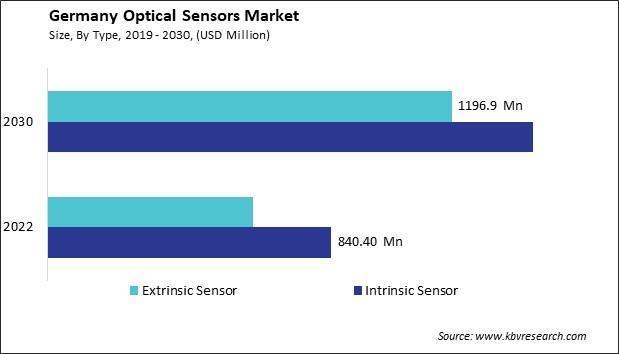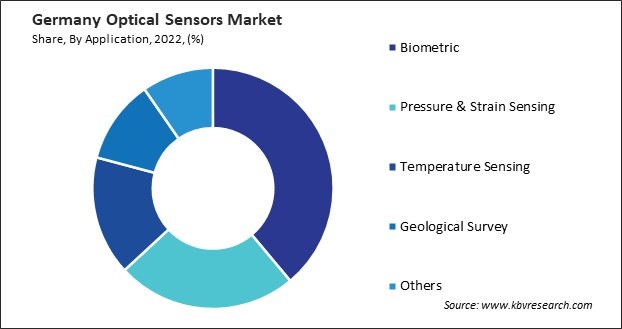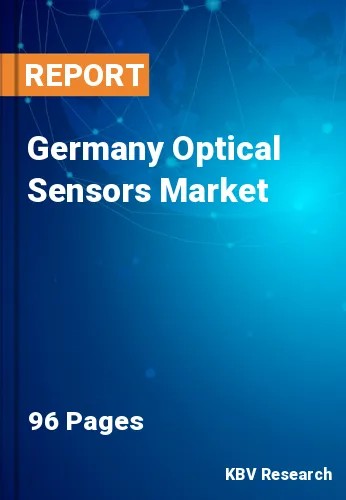The Germany Optical Sensors Market size is expected to reach $2.6 Billion by 2030, rising at a market growth of 7.9% CAGR during the forecast period.
Renowned for its technological prowess and industrial innovation, Germany is a key player in the global optical sensors market. The manufacturing sector in Germany has been a pioneer in Industry 4.0, the fourth industrial revolution characterized by smart factories and interconnected systems. Optical sensors play a crucial role in smart manufacturing by providing data for process optimization, quality control, and predictive maintenance. As German industries continue to embrace digitalization, the demand for optical sensors as integral components of smart systems is expected to grow.

Consumer electronics is another sector where Germany has made significant contributions, with companies producing high-quality devices and gadgets. Optical sensors find applications in smartphones, cameras, and wearables, enhancing user experiences through features like facial recognition, gesture control, and augmented reality. The constant innovation in consumer electronics drives the demand for advanced optical sensor technologies.
The positive impact of COVID-19 on the optical sensors market in Germany has been notable. The pandemic accelerated the digitization of industries, with companies seeking innovative solutions to ensure business continuity. This shift towards digital transformation has increased the demand for optical sensors, especially in contactless sensing and monitoring areas. The healthcare sector, in particular, witnessed a surge in demand for medical devices equipped with optical sensors to aid in remote patient monitoring and diagnostics, aligning with the need to reduce physical contact.
Germany has witnessed a substantial surge in the demand for extrinsic optical sensors, establishing a robust presence in the country's thriving optical sensors market. One of the key drivers behind the increasing demand for extrinsic optical sensors in Germany is the nation's commitment to advanced manufacturing and Industry 4.0 initiatives. As a global leader in industrial automation, Germany has embraced smart manufacturing technologies that heavily rely on sensors for data acquisition and process optimization.
Moreover, the emphasis on sustainability and environmental monitoring in Germany has fueled the adoption of extrinsic optical sensors. These sensors are deployed in environmental monitoring systems to measure air and water quality, contributing to the nation's commitment to ecological conservation and sustainable development. Germany's healthcare industry has also contributed to the rising demand for extrinsic optical sensors. With advancements in medical technology, these sensors are utilized in various diagnostic and monitoring applications, ranging from blood glucose monitoring to imaging equipment.
The automotive sector has significantly contributed to the demand for extrinsic optical sensors. The need for high-performance optical sensors has escalated as vehicles become more advanced and incorporate features like adaptive cruise control, collision avoidance, and autonomous driving capabilities. Extrinsic optical sensors enable precise distance measurement and object detection, enhancing the safety and functionality of modern vehicles in Germany.
According to Germany Trade & Invest, German automobile manufacturers produced over 15.6 million vehicles in 2021. Notably, Germany emerged as the European leader in car production, with German plants producing more than 3.1 million passenger cars and 351,000 commercial vehicles in 2021. This dominance extends beyond traditional manufacturing, as Germany's influence in the automotive sector extends to cutting-edge technologies. One such expansion area is the integration of optical sensors in the German automobile industry. As the industry continues to evolve, these sensors play a crucial role, contributing to advancements in safety, automation, and overall vehicle performance.
In recent years, Germany has witnessed a significant rise in the adoption of photoelectric sensors, contributing to the burgeoning optical sensors market in the country. The ongoing trend toward smart manufacturing and the widespread implementation of Industry 4.0 principles have fueled the demand for photoelectric sensors. These sensors enable real-time data acquisition and communication in manufacturing systems, aligning with Germany's strategic focus on achieving interconnected and adaptive production environments.
The German manufacturing sector has been a key driver in the increased adoption of photoelectric sensors. With a strong emphasis on Industry 4.0, German industries are integrating these sensors into their automated production lines. Photoelectric sensors, renowned for their versatility in detecting various materials, are vital in ensuring precision and efficiency in manufacturing processes.
Additionally, the heightened focus on energy efficiency and sustainability in Germany has led to the deployment of photoelectric sensors in lighting control systems. These sensors are crucial in optimizing energy consumption by adjusting lighting levels based on occupancy and ambient conditions. Thus, the surge in photoelectric sensor adoption within Germany's manufacturing sector, driven by Industry 4.0 initiatives and a commitment to energy efficiency, underscores these sensors' pivotal role in advancing precision, efficiency, and sustainability across diverse industrial applications.

The optical sensors market in Germany is a dynamic and thriving sector characterized by various companies at the forefront of technological innovation. These companies play a crucial role in shaping the landscape of optical sensor technology, catering to diverse industries such as automotive, healthcare, industrial automation, and consumer electronics.
One prominent player in the German optical sensors market is Bosch Sensortec GmbH, a subsidiary of the Bosch Group. Known for its cutting-edge sensor solutions, Bosch Sensortec specializes in micro-electro-mechanical systems (MEMS) technology. The company's optical sensors find applications in smartphones, wearables, and augmented reality devices, contributing to the growing demand for advanced sensing capabilities in consumer electronics.
Another key player is SICK AG, which has significantly contributed to the optical sensor market in Germany. Specializing in sensor intelligence and application solutions, SICK AG provides a wide range of optical sensors for industrial automation. These sensors are instrumental in enhancing the efficiency and safety of manufacturing processes, aligning with Germany's strong focus on advanced manufacturing and Industry 4.0 initiatives.
IFM Electronic GmbH is renowned for its sensor solutions that cater to various industries, including automotive, food and beverage, and packaging. The company's optical sensors play a crucial role in automation and control applications, contributing to optimizing industrial processes. IFM Electronic GmbH's presence in Germany underscores the country's position as a hub for innovative sensor technologies.
In the automotive sector, Osram Opto Semiconductors GmbH stands out as a key player in the German optical sensors market. The company specializes in optoelectronic semiconductors and offers automotive lighting, sensing, and visualization solutions. Osram's optical sensors contribute to advancements in automotive safety, driver assistance systems, and autonomous driving technologies.
First Sensor AG is recognized in the healthcare sector for its innovative sensor solutions, including optical sensors used in medical devices. The company's contributions align with Germany's emphasis on healthcare technology and innovation, playing a role in developing advanced medical equipment. From automotive to healthcare and industrial automation, these companies play a pivotal role in shaping the landscape of optical sensor technology, reflecting Germany's commitment to innovation and excellence in the field of optical sensor technology.
By Type
By Application
By Sensor Type
By End-use
Our team of dedicated experts can provide you with attractive expansion opportunities for your business.

